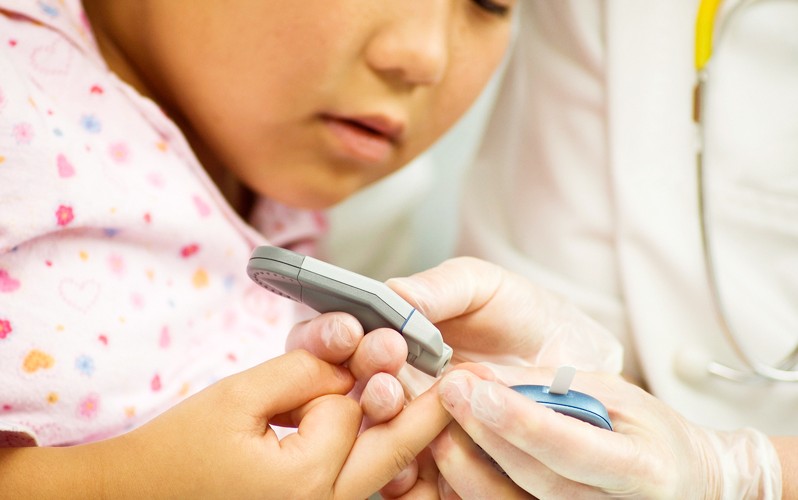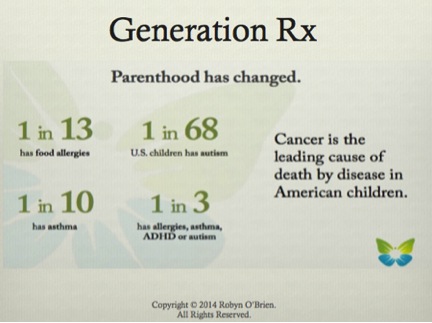
by guest blogger Robyn O’Brien, author and former financial and food-industry analyst
The last few weeks have brought about a flurry of headlines for 21st-century parents: A new food allergy study suggested that we should be feeding our babies peanuts after a prior study suggested the opposite. A Girl Scout troop in Houston, made up entirely of girls with type 1 diabetes, revealed a wave of unintended misunderstanding around the condition when their work was shared online. Food companies like Nestle, Hershey’s, and McDonald’s dropped controversial ingredients that we’d previously been told not to worry about. And it won’t stop there.
Every day, the status quo is being challenged, and it’s enough to make anyone’s head spin. It gets people talking, and in some cases, shots were fired across social media. Parents today are often caught in a tsunami of emotions: fear, grief, hope, and just about everything in between.
The landscape of parenthood has changed. No generation has dealt with the escalating rates of conditions and diseases in kids this one has. The health of our families is changing so fast that it’s hard for us to grasp, much less know how to manage it.
This generation of children has earned the title of “Generation Rx” due to the escalating rates of conditions like diabetes, food allergies, autism, ADHD, and so much more it has seen.

But what about the parents? If our children are “Generation Rx,” what are we? “Parenthood Rx”? Prescription Parents?
How are we getting through it? Do we need a label to describe what we are going through—beyond Mom and Dad? I don’t think so.
As we work with doctors who don’t yet know what’s causing these conditions and try to explain to parents and grandparents who don’t understand where all of this has come from or how different it could be, one thing is universal: Love is a rocket fuel, and it is propelling us through. Fear is paralyzing. In parenthood, isn’t an option.
It is critical to do what we can to support each other in this changing landscape.
So while one of us may be dealing with a child with life-threatening food allergies, another might be dealing with life-gripping fear for a child with type 1 diabetes, and another might be dealing with the challenges of a child on the autism spectrum.
So what can we do? We can share data about this generation of kids. We can bridge an understanding, knowing how many are now coping with conditions affecting the health of their little ones, and we can learn how to love through it, not to judge, so that our families cannot just survive but can thrive.
A brief list of what parents today are dealing with:
- According to the World Health Organization, the U.S. ranks 37th out of 40 countries (on par with Slovenia) in terms of “health care.”
- From 1997 to 2010, the rate of the prevalence of the peanut allergy in the United States more than quadrupled.
- 10 percent of U.S. infants now test positive to a skin-prick test for the peanut allergy.
- Children born in the U.S. have more than a 1 in 3 chance of having allergic diseases like food allergies, asthma, or eczema, while kids born in other countries had a “significantly lower prevalence” (1 in 5).
- A food allergy reaction sends someone to the emergency room once every three minutes in the United States.
- Autism rates are now 1 in 68 children in the U.S.
- The prevalence of type 1 diabetes in Americans under age 20 rose by 23 percent between 2001 and 2009.
- Cancer is now the leading cause of death by disease in U.S. children.
- Every day, 43 children are diagnosed with cancer.
Enough. It’s time to say enough.
So what can we do? How do we turn “Generation Rx” into “Project Cure”?
- Find friends to lean on. The friends who have battled pediatric cancer, the friends who were sideswiped by a type 1 or food allergy diagnosis, the friends on the frontlines of autism. They won’t be all in one family, but they are all around us. Among the parents on the sidelines at soccer games, at pick up at preschool, in the lunchroom at school. And because of what we’re going through, we know what those parents are going through, too.
- Call for more science, more research, more studies, and more funding to examine these issues in children.
- Exercise precaution where you can. The only way we can take responsibility for the health of our children is to be given full disclosure on research, on product formulation, on ingredients. Freedom of choice is a founding principal of our country.
- Opt out of artificial where you can. Eat less fake food. Don’t make the perfect the enemy of the good. Do what you can, where you are, with what you have. Real children deserve real food. The goal is to make it affordable and accessible to everyone.
We are the first ones here on this frontline. We need each other because, while we may not yet realize it, we are building our legacy in real time.
In 1946, Harry Truman said, “A nation is only as healthy as its children”.
Our children have earned the title of “Generation Rx,” and if that is any indicator for our nation then, according to Truman, our economy will be “Economy Rx.”
It’s time to pause and consider what we can do to not only treat the conditions, but also to restore the health of our children and the health of our nation. Because while our children may represent less than 30 percent of our population, they are 100 percent of our future.
 Robyn O’Brien is a former financial analyst who covered the food industry. You can learn more at www.robynobrien.com.
Robyn O’Brien is a former financial analyst who covered the food industry. You can learn more at www.robynobrien.com.




Amen Robyn! The fact that so many other countries with less resources, less money, etc. have better health care than we do, and some of the GOP members of Congress want to do away with the ACA healthcare for all our citizens….says more about who really runs this country, i.e. the Koch Brothers and other 1% rich, than it does about what our priories really are. We do need to research and find out what is best for us, because the big corporations are not going to be the ones to depend on, especially if their agenda is making big profits. Our children depend on US and we need to do all we can to be there for them!!
Great post! As a mama to a toddler, I’m freaked out, but I’m glad people are calling it out. As an addition to the list, I’d urge people to PLEASE avoid plastic food containers/cups/etc.! (See my link)